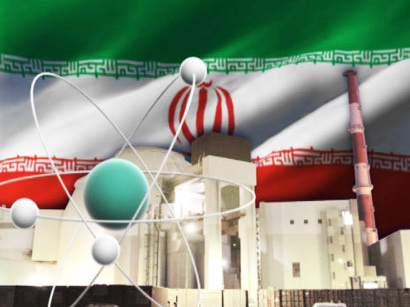 Iran's Khamenei orders boost in uranium enrichment capacity
Iran's Khamenei orders boost in uranium enrichment capacity
Al-Monitor Staff
Iranian Supreme Leader Ayatollah Ali Khamenei on June 4 ordered the country’s Atomic Energy Organization to make preparations for boosting uranium enrichment capacity within the requirements of the Joint Comprehensive Plan of Action (JCPOA).
In remarks on the occasion of the anniversary of the death of the Islamic Republic’s founder, Ayatollah Ruhollah Khomeini, the Iranian leader warned Europe, saying, "Some European governments are acting as if the Iranian nation has to endure these sanctions and their effects, while at the same time [Iran] must cease nuclear activities — which we will certainly need in the future — and curb the nuclear program."
He added, "The West's dream regarding the JCPOA will not come true. … The Atomic Energy Organization of Iran must make the necessary arrangements to reach 190,000 SWU [separative work units] in the framework provided by the JCPOA, and it must begin some other preparations that Mr. President has ordered [previously] effective tomorrow." SWU is a unit that measures uranium isotope separation, i.e., uranium enrichment capacity.
This is not the first time that the Iranian leader has spoken of the necessity of achieving 190,000 SWU enrichment capacity; he also did so during the 2013-15 negotiations, which led to the nuclear deal, then calling it an “absolute need” though without specifying the timeline for achieving such a capability.
One day after Khamenei's speech, Ali Akbar Salehi, a vice president of Iran and the head of its Atomic Energy Organization, said that the current nuclear infrastructure of the country can rapidly be ramped up if given the order to do so.
"If we withdraw from the JCPOA, we can urgently add centrifuges and increase the capacity of our enrichment, and [we can achieve 190,000 SWU capacity] in a maximum of two years," Salehi said June 5. He said, "We currently work within the framework of the JCPOA, and we won't do anything in violation of the JCPOA as this is the order of the supreme leader."
Hassan Abedini, a political analyst of the state broadcaster, appeared on Iran's Channel 1, saying June 4, "The need for 190,000 SWU is necessary to [fuel the reactors at] the Bushehr and Tehran nuclear plants." He continued, "To achieve 190,000 SWU in enrichment of uranium, we [should] produce hydrofluoric gas which, of course, is not considered as a violation of the JCPOA."
Meanwhile, pro-reform academic Sadegh Zibakalam believes that Iran's nuclear policy is returning to the era of former hard-line President Mahmoud Ahmadinejad.
"The new nuclear approach announced by the supreme leader is the last shot at Europe's efforts to reach a compromise with the US, and on the other hand, is the end of the [moderate] policy of the government of Mr. Rouhani in the past five years," Zibakalam tweeted June 5.
He concluded, "It is not important if Rouhani stays or leaves; what is important is that we returned to the era of Mr. Ahmadinejad."
In reply to Zibakalam's tweet, outspoken Reformist member of parliament Mahmoud Sadeghi argued that Khamenei's order is not in violation of the JCPOA. Sadeghi tweeted June 5, “The Leader's approach isn’t inconsistent with the JCPOA; He explicitly emphasized on ‘Within the framework of the JCPOA for now.’ Based on JCPOA, European sides, like the US, are required to lift the sanctions. The ‘for now’ term indicates that if Europe does not fulfill its obligations, Iran will have the right, based on the JCPOA, to withdraw from the JCPOA."
Meanwhile, the conservative ANA news agency argued that Khamenei's order has put the onus on Europe to uphold the nuclear deal.
"The order [to eventually achieve enrichment capacity] of 190,000 SWU was issued by the Leader while the US government tore up the JCPOA and the residents of the green continent are seeking [to achieve another] Joint Comprehensive Plan of Action or improving the JCPOA," the Ana news agency wrote June 5. The news agency added, "[Khamenei’s order] has frustrated the West and has thrown the ball in the Europeans' court."
Describing Khamenei’s order as "strategic," conservative member of parliament Hossein Naghavi Hosseini, the spokesman of parliament’s national security and foreign policy commission, on June 5 was not positive about the prospects of Europe to provide Iran with the economic dividends promised by the JCPOA. He said, "Therefore, we shouldn’t waste the time of the Iranian nation and the establishment, and [we shouldn’t] wait for [European] governments, which don’t honor their commitments."
No comments:
Post a Comment